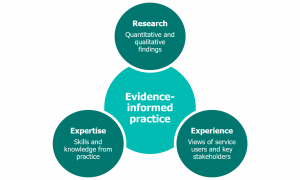Introduction
Within HM Inspectorate of Probation, we are committed to reviewing, developing and promoting the evidence base for high-quality probation services. We use both research and inspection findings to:
- inform our understanding of what helps and what hinders probation services
- develop our inspection programmes, guidance and effective practice products
- consider system-wide change that could improve public protection, support desistance, and change people’s lives for the better.
In this evidence resource, we summarise key research findings, presenting them as concisely as possible. We start with the principle that probation work should be evidence based or else evidence led. It is a strategic aim of government that probation services should reduce reoffending, while also taking all reasonable steps to keep the public safe. In our view, this is most likely if probation practice is aligned to the evidence base, and if the evidence base grows over time.
We will continue to develop this evidence resource, making updates when required to reflect the latest research evidence. While there is a growing consensus on key aspects of the delivery of high-quality services, e.g. the importance of practitioner relationship skills, there remains much scope for expanding and strengthening the evidence base. For example, most research and evaluation studies within probation lack an economic component, with the consequence that robust evidence on both the costs and benefits of differing approaches and interventions is generally lacking. Continuing investment in research and evaluation is required, with a commitment to disseminating and promoting the findings.
Next: Models and principlesLast updated: 18 December 2020




